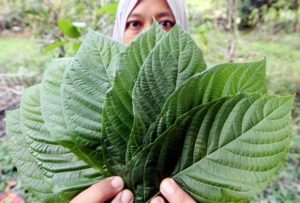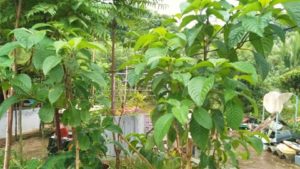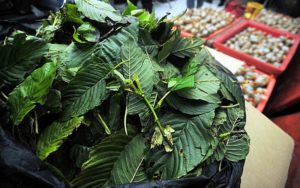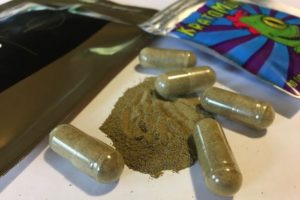By Dzulkifli Abdul Razak
As the burning issue of nicotine being delisted rages on, and the deafening silence from the minister concerned, her former counterpart, of late, throws in another item that could even heightened the theatrics.

The new ‘actor’ is known as ‘ketum’ or ‘kratom’ to some. Regarded as organically part of our local vegetation especially in the Semenanjung, it has integrated well into the cultural milieu for a long time.
Without attracting much attention, it has been consumed traditionally by the locals who knew well how to gain the optimal ‘recreational health’ benefits from its use. Especially, in the labour intensive agro-based community, ketum has its role in subtle ways, much like the coca leaves in the several Latin American communities then.
For example, ketum leaves have often been “used traditionally for general health and for energy boost to do heavy jobs”. The leaves are normally boiled to produce a ketum drink or “juice” for personal consumption.
Ketum leaves are also considered as traditional medicines to treat discomfort such as “back pain, fever, cough and worms as well as diseases such as diabetes and high blood pressure” as documented by MyHEALTH, the Ministry of Health (MOH) official portal.

In contrast, tobacco does not list such claims to be acknowledged by MOH.
In fact, it is adopted as a cash crop promoted for its revenue generating purposes largely in the east coast of Semenanjung; while ketum, a plant belonging to the coffee family, is found in the wild and around villages as part of the natural habitat notably in northern Semenanjung.
It is said to be indigenous to Thailand, Indonesia, Myanmar and Papua New Guinea as well.
Given the dimensions of ketum tropical trees (up to 25 metres high and diameter of the trunk can reach up to one metre), its leaves are not easily harvested for use, and hence not as widely (mis)used as compared to tobacco which are commercially made available as a profit-making commodity.
It even commands special merchandising sites at duty-free outlets under ironic mandatory labels such as “Smoking Kills.” How much more schizophrenic can one get in defending and promoting the use of a killer-product openly is baffling?
The differences between the two leaves are plenty, but most noticeable is the fact that ketum does not contain the highly addictive poison that is well-documented and exploited for the promotion of the sales of tobacco worldwide.
Ketum, on the other hand, contained an active substance called ‘mitragynine,’ among others.
Its overall impact is somewhat milder in contrast to that of nicotine, by extension tobacco-related use in the various forms, vape included. Some of the more common effects reported include: feeling euphoric, dizzy, drowsiness and vomiting. On continuous intake, it can lead to addiction, insomnia and constipation.
In mid-2000s, there was plan to table an amendment to the Dangerous Drugs Act (DDA)1952 including reclassifying ketum leaves as a dangerous drug in order to tighten the control pertaining to its import, export, possession and cultivation; in addition, to allow the power to regulate the production of ketum leaves. Until that happens, it remains under the current Poisons Act 1952.
This indeed serves as the most blatant contradiction when on April 1, nicotine – by far more harmful and addictive ingredient – was delisted from the same Act, when arguably nicotine could easily be reclassified for the DDA 1952 in the context of public health.

Nevertheless, due to the lack of international consensus over the status of ketum, it is generally not referred to as a “drug”.
In other words, it cannot be regarded as similar to other commonly used illegal drugs like marijuana (ganja), heroin, cocaine, amphetamines and methamphetamines and the likes.
However, it is not spared from being destroyed by the power that be, and warning those involved “that their land rights could be taken away from them if they continue to plant ketum trees.”
Yet, tobacco plantation owners continued to be ‘protected’ despite knowing full well that tobacco kills Malaysians in the tens of thousands annually, some prematurely, and counting. For sure, such is not the case for ketum, despite complaints of abuses, trafficking and profiteering from the illegal sales of the material.
All things considered, they are miniscule vis-à-vis that of tobacco and vape companies covering the entire nations without any care on the implication over their actions.

Not surprisingly, the grand ambition to replace tobacco plantations with alternative crops has also failed to materialise thanks to the persuasive power of the tobacco industry.
Such a clear double standard can never be explained scientifically, putting the ministry of health on a very flimsy policy framework, if at all, on the issues related to elimination of nicotine addiction which stands at par with that of heroin or cocaine, listed as DDA 1952 items.
In other words, should any delisting be deemed necessary, ketum must take priority over nicotine.
When science is subjugated to greedy and addictive industry as well as politics, whims and fancies, not only healthcare becomes chaotic, economics too will follow suit, since both are closely knitted.
Today, we are at the critical juncture to decide on the need for bold initiatives and strong leadership to move forward constructively for the sake of humanity. Here, silence is not golden!
- The writer is a neuropharmacologist, and served as the inaugural director of National Poisons Centre (PRN) at USM




